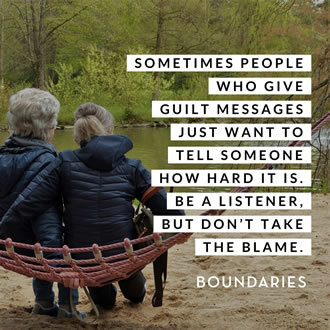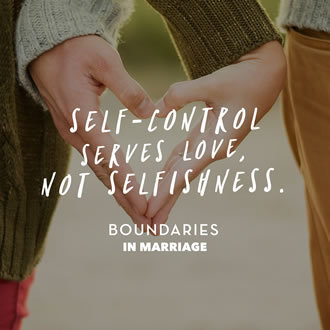Henry Cloud's Blog, page 5
October 15, 2019
Am I Being Selfish When I Set Boundaries?
 “Now, wait a minute,” Teresa said, shaking her head. “How can I set limits on those who need me? Isn’t that living for me and not for God?”
“Now, wait a minute,” Teresa said, shaking her head. “How can I set limits on those who need me? Isn’t that living for me and not for God?”
Teresa was voicing one of the main objections to boundary setting for Christians: a deep-seated fear of being self-centered, interested only in one’s own concerns and not those of others.
It is absolutely true that we are to be a loving people. Concerned for the welfare of others. In fact, the number-one hallmark of Christians is that we love others (John 13:35).
So don’t boundaries turn us from other-centeredness to self-centeredness? The answer is no. Appropriate boundaries actually increase our ability to care about others. People with highly developed limits are the most caring people on earth. How can this be true?
First, let’s make a distinction between selfishness and stewardship. Selfishness has to do with a fixation on our own wishes and desires, to the exclusion of our responsibility to love others. Though having wishes and desires is a God-given trait (Proverbs 13:4), we are to keep them in line with healthy goals and responsibility.
For one thing, we may not want what we need. Mr. Insensitive may desperately need help with the fact that he’s a terrible listener. But he may not want it. God is much more interested in meeting our needs than he is granting all our wishes. For example, he denied Paul’s wish to heal his “thorn in the flesh” (2 Corinthians 12:7–10). At the same time, he met Paul’s needs to the point that Paul felt content and full:
I know what it is to be in need, and I know what it is to have plenty. I have learned the secret of being content in any and every situation, whether well fed or hungry, whether living in plenty or in want. I can do everything through him who gives me strength. (Philippians 4:12–13)
It helps the Christian afraid of setting boundaries to know that God meets our needs. “God will meet all your needs according to his glorious riches in Christ Jesus” (Philippians 4:19). At the same time, God does not make our wishes and desires “all bad” either. He will meet many of them.
Our Needs Are Our Responsibility
Even with God’s help, however, it is crucial to understand that meeting our own needs is basically our job. We can’t wait passively for others to take care of us. Jesus told us to “Ask … seek … knock” (Matthew 7:7). We are to “work out [our] salvation with fear and trembling” (Philippians 2:12). Even knowing that “it is God who works in [us]” (Philippians 2:13), we are our own responsibility.
________
Click to Tweet: When we say no to people and activities that are hurtful to us, we are protecting God’s investment.
________
This is a very different picture than many of us are used to. Some individuals see their needs as bad, selfish, and at best, a luxury. Others see them as something that God or others should do for them. But the biblical picture is clear: our lives are our responsibility.
At the end of our lives this truth becomes crystal clear. We will all “appear before the judgment seat of Christ, that each one may receive what is due him for the things done while in the body, whether good or bad” (2 Corinthians 5:10). A sobering thought.
The Gift of Stewardship
A helpful way to understand setting limits is that our lives are a gift from God. Just as a store manager takes good care of a shop for the owner, we are to do the same with our souls. If a lack of boundaries causes us to mismanage the store, the owner has a right to be upset with us.
We are to develop our lives, abilities, feelings, thoughts, and behaviors. Our spiritual and emotional growth is God’s “interest” on his investment in us. When we say no to people and activities that are hurtful to us, we are protecting God’s investment. As you can see, there’s quite a difference between selfishness and stewardship. That’s why boundaries make life better!
_______
From Boundaries by Dr. Henry Cloud and Dr. John Townsend. A New York Times Bestseller!
 Get The 10 Laws of Boundaries eBook when you subscribe to the Boundaries Weekly email newsletter. Learn More
Get The 10 Laws of Boundaries eBook when you subscribe to the Boundaries Weekly email newsletter. Learn More
The post Am I Being Selfish When I Set Boundaries? appeared first on Boundaries Books.
October 8, 2019
How to Handle Guilt Messages from Your Mom
 Tabitha telephoned her mother, who answered the phone weakly with hardly any voice at all. Concerned, thinking she was sick, Tabitha asked, “Mother, what’s wrong?”
Tabitha telephoned her mother, who answered the phone weakly with hardly any voice at all. Concerned, thinking she was sick, Tabitha asked, “Mother, what’s wrong?”
“I guess my voice doesn’t work very well anymore,” she replied. “No one calls me since you children left home.”
No weapon in the arsenal of a controlling person is as strong as the guilt message. Daughters or sons with poor boundaries almost always internalize guilt messages leveled at them by their mother; they obey guilt-inducing statements that try to make them feel bad. Consider these:
“How could you do this to me after all I’ve done for you?”
“It seems that you could think about someone other than yourself for once.”
“How can you abandon me like this?”
“Maybe after I’m dead and gone, you’ll be sorry.”
“How can you call yourself a Christian?”
“Doesn’t the Bible say ‘Honor your parents’?”
“You must really have a spiritual problem to be acting this way.”
“You know how it’s turned out in the past when you haven’t listened to me.”
“You have no idea how much I’ve sacrificed for you.”
A mother who says these types of things is trying to make you feel guilty about your choices. She is trying to make you feel bad about deciding how you will spend your own time or resources, about growing up and separating from her, or about having a life separate from the family.
However, in the biblical parable told in Matthew 20:1-16, Jesus says that we are to give and not be self-centered. Notice that it does not say that we have to give whatever anyone wants from us. We are in control of our giving.
You can probably recognize guilt messages when you hear them. But if you feel bad about your response, maybe you have not looked specifically at the approach your mother or other people are using. Here are six suggestions about dealing with these external messages:
1. Recognize the guilt messages.
Some people swallow guilt messages without seeing how controlling they are. Sure, we need to be open to rebuke and feedback, because we need to know when we’re being self-centered. However, guilt messages are not given for your growth and good. They are given to manipulate and control.
2. Guilt messages are really anger in disguise.
The guilt sender is failing to openly admit her anger at you for what you are doing, probably because that would expose how she is trying to control you. She focuses on you and your behavior, rather than on how she feels. Focusing on her feelings would get her too close to responsibility.
3. Guilt messages hide sadness and hurt.
Instead of expressing and owning these feelings, some parents try to steer the focus onto you and what you are doing. Recognize that guilt messages are sometimes an expression of a person’s sadness, hurt, or need.
4. If guilt works on you, recognize that it is your problem.
That’s right, the core issue is not your mother’s problem. Realize where the real trouble resides, which is inside your mind. Then you will be able to deal with the outside correctly, using love and limits. If you continue to blame your mother for “making” you feel guilty, then she has power over you. And, you are saying that you will only feel good when she stops doing that. You are giving her control over your life. Stop blaming other people.
5. Do not explain or justify.
Only guilty individuals defend their position, and that only plays into the guilt sender’s message. You do not always owe an explanation. Just tell what you have chosen. If you tell your mother the reason why you made a certain decision in order to help her understand, that is okay. But, if you justify your reason in order to get her to stop making you feel bad or to resolve your inner guilt, then you are playing into the guilt trap.
6. Be assertive and interpret guilt-styled messages as being about the other person’s feelings.
Take time to acknowledge how your mother feels by saying like:
“Mom, it sounds like you are angry that I chose to…”
“It sounds like you are sad that I will not…”
“I understand you’re unhappy about what I have decided to do. I’m sorry you feel that way.”
“I realize this is disappointing to you. How can I help?”
“It’s hard for you when I have other things to do, isn’t it?”
The main principle is this: When someone tries to make you feel guilty, empathize with the distress that she might be feeling. But, make it clear that it is her distress.
________
Click to Tweet: Sometimes people who give guilt messages just want to tell someone how hard it is. Be a listener, but don’t take the blame.
________
Remember, love and limits are the only clear boundaries. If you react negatively, you have lost your boundaries. Proverbs 25:28 says, “Like a city whose walls are broken down is a man without self-control.” If your mother has the power to make you react, then she is inside your walls, inside your boundaries. Stop reacting. Be proactive. Give empathy. “Mom, it sounds like life is hard right now. Tell me about it.” Sometimes people who give guilt messages just want to tell someone how hard it is. Be a listener, but don’t take the blame.
Remember our earlier example of the mother who tried to make her daughter, Tabitha, feel guilty? A woman with good boundaries would empathize with her mother and say, “It sounds like you are feeling lonely, Mom.” She would make sure that her mom hears that she knows the feeling beneath the guilt message.
As much as possible, bring truth and grace to the relationship with your mom. What a blessing to be a redemptive force for their lives, even in her later years!
________
Learn more about how to set boundaries from a biblical perspective with family members and others in The New York Times bestselling book Boundaries by Dr. Henry Cloud and Dr. John Townsend.
The post How to Handle Guilt Messages from Your Mom appeared first on Boundaries Books.
October 2, 2019
What Boundaries Are Really All About
 There is a lot of misunderstanding about boundaries, especially in the context of marriage. Some people are against boundaries because they see them as selfish. Other people actually use boundaries to be selfish. Both are wrong. Boundaries in marriage are basically about self-control.
There is a lot of misunderstanding about boundaries, especially in the context of marriage. Some people are against boundaries because they see them as selfish. Other people actually use boundaries to be selfish. Both are wrong. Boundaries in marriage are basically about self-control.
A client once said to me (Dr. Townsend), “I set some boundaries on my husband. I told him that he could not talk to me that way anymore. And it did not work. What do I do now?”
“What you have done is not boundaries at all,” I replied.
“What do you mean?”
“It was your feeble attempt at controlling your husband, and that never works.” I went on to explain that boundaries are not something you “set on” another person. Boundaries are about yourself.
My client could not say to her husband, “You can’t speak to me that way.” This demand is unenforceable. But she could say what she would or would not do if he spoke to her that way again. She could set a boundary “on herself.” She could say, “If you speak to me that way, I will walk out of the room.” This threat is totally enforceable because it has to do with her. She would be setting a boundary with the only person she could control: herself.
________
Click to Tweet: Self-control serves love, not selfishness.
________
When you build a fence around your yard, you do not build it to figure out the boundaries of your neighbor’s yard so that you can dictate to him how he is to behave. You build it around your own yard so that you can maintain control of what happens to your own property. Personal boundaries do the same. If someone trespasses your personal boundaries in some way, you can take control of yourself and not allow yourself to be controlled, or hurt, anymore. This is self-control.
And ultimately, self-control serves love, not selfishness. We hope that when you take control of yourself, you will love better and more purposefully and intentionally so that you and your spouse can have the intimacy you desire.
________
For more insights to improve the way you interact with your spouse, read Boundaries in Marriage.
The post What Boundaries Are Really All About appeared first on Boundaries Books.
September 20, 2019
Setting Boundaries at Work
 While I (Dr. Cloud) was consulting with one of the biggest companies in North America, an employee told me, “We would be so much better off if my boss would set better boundaries on what goes on with individuals on our team. He plays the ‘nice guy’ role too much, and as a result, the team suffers.”
While I (Dr. Cloud) was consulting with one of the biggest companies in North America, an employee told me, “We would be so much better off if my boss would set better boundaries on what goes on with individuals on our team. He plays the ‘nice guy’ role too much, and as a result, the team suffers.”
Surprisingly, a lack of confrontation goes in the other direction as well. One vice president told me something I hear often as a consultant: “I wish my people would come clean with me. I wish they would tell me what they really think. I wish they would be more open and direct. But they are scared to do that.”
If you are like most people, you spend a lot of your life at work. Work is a place with many possibilities for stress, conflict, risk, and loss. It is a place where you put in the best of who you are. You are serving, and at times sacrificing, trying to please, and also establishing friendships on the teams with whom you work. So it naturally follows that you can experience some emotionally trying times there.
In addition, you have a job to do. Sometimes, in the course of doing your job, you have to establish boundaries with other people who are not doing their jobs well. They may be your colleagues or people you manage and supervise or your supervisors and bosses. Much rides on your ability to communicate well. It may make a difference not only in how you feel on the job, but also whether your company or department performs well.
Understanding Task and Relationship
When you look at leadership research, management theory, and all the things that have ever been studied about how good work environments operate, two areas always emerge: task and relationship. Work has to do with getting a job done (the task) and getting along well with the people who are doing the task (the relationship). We work hard at tasks, and we do that with other people. It’s important that the two work together.
Both of these areas depend on establishing good communication and confrontation skills. To get a job done, we have to solve problems and “face” things. To get along well, we have to work out relational issues with each other through facing things as well. So the entire arena of work requires good confrontation skills to work well. Confront well, and you will work better also. The best teams and the best work cultures are those that confront well.
________
Click to Tweet: The best teams and the best work cultures are those that confront well.
________
Tips for Confronting and Setting Boundaries at Work
People are afraid to confront those over them as well as those under them. Often there are accountability structures established at work, and policies in place streamline interactions along the chain of command. The problem is more often that people don’t confront rather than that they can’t. That is why I regard a lack of confrontation as more of a personal issue than a “work” or “authority” issue. What can you do? Here are some helpful tips for confronting people at work.
Discover the policies already in place. Find out what formal communication policies guide how things are dealt with. Some things, such as sexual harassment, fall outside of the realm of talking to your co-worker; they require a formal procedure. Your human resources department or your supervisor will probably be able to help you there.
Ask your boss. If there is no formal communication structure in place, the good old-fashioned way of finding this out is to ask. Ask your boss or supervisor how she would like you to handle talking to her about issues the two of you encounter. For example:
“Lynn, I want to have the best working relationship we can, and I want to do the best job possible for you. How do you want us to talk about things when an issue arises between us? Do I have the freedom to be really direct and clear about how we are doing together? Do I have to worry that I will be in trouble? How often would you like for us to ‘check in’ with each other to clean up lingering issues? Or do you have a preference for less structured meeting times and dealing with issues as they come up?”
Those are probably more questions than you want to ask, but you get the idea. Many times, just talking to a boss or supervisor about how the two of you want to work with each other is very helpful.
Be direct. Go to your co-worker and talk directly about how the two of you should resolve conflict or solve problems. Putting it into a “solving problems” mode is probably less threatening. Have a talk over lunch or at a coffee break about how to do that, before there is an issue, if possible. Coming up with the ground rules and expectations beforehand is key. Covenant with each other to keep short accounts and to help each other by giving feedback.
Communicate Your Boundaries with Co-workers
Years ago, I walked into the office, and one of our employees (lets call her Susie) was crying. I asked her what was wrong, and she just shook her head no, as if to say she couldn’t talk about it. I pressed, though, as it was clear she was in a lot of distress.
“I just don’t know what to do,” she said. “Bill keeps asking me to do favors, and I can’t get my work and his done, too. I don’t know if I can work here anymore.”
“What is he doing?”
“He dashes out the door and asks me if I could ‘just drop something by at the printer’ for him, as he has an important meeting to go to.”
“Have you told him you can’t?” I asked.
“I say I don’t have time, but he just says it won’t take long and it would really help him, so I do it. Saying no hasn’t helped.”
“Well, saying it might not, but doing it would. I know Bill, and I would suggest a twofold approach. First, why don’t you tell him what this feels like to you? Tell him that you want to help, but you have too much of your own work to do and you can’t help him out anymore. Then tell him that you think he probably doesn’t know how this is affecting you. Tell him that you are so troubled by the trap you feel you are in that you are thinking of quitting. Tell him how hard it is to be under that pressure and that it is affecting your whole outlook on working here.”
She did confront him, and the outcome was great. While poor at seeing how his favors were too much to ask, he was good at responding to how others feel. He heard her and was saddened that he had made her work life so difficult for her.
Often, if you can be clear about a problem’s effect on you, and if you can help the other person see that this is the reason you are talking about it, you can resolve it. When you express how you are being hurt by something, as opposed to how someone else is “wrong,” many co-worker issues go away. Teamwork begins with understanding how we can help make one another’s load lighter.
People feel the need to address many different topics. Only you know what your issues are, but here are some common “talks” you might need to have at work:
“I feel like I am pulling more than my share of the weight. . . .”
“You interrupt me a lot. . . .”
“Please turn down your radio. . . .”
“I can’t find you when I need you. . . .”
“I need for you to get back to me sooner. . . .”
“I have to wait long periods of time for you to get things to me we have agreed on. . . .”
Certainly there are many more issues, but what they all have in common is that another person is working in a way that affects you and your work. Since you are not the boss, instead of evaluating someone’s performance, share how you want things to work better between you and the other person so you can work more effectively. If you can face your co-worker and use the principles focusing on how it affects you and the task, you will have a greater chance at resolution.
________
If setting boundaries at work has you stressed out, find solutions in Boundaries for Leaders.
 Get The 10 Laws of Boundaries eBook when you subscribe to the Boundaries Weekly email newsletter. Learn More
Get The 10 Laws of Boundaries eBook when you subscribe to the Boundaries Weekly email newsletter. Learn More
The post Setting Boundaries at Work appeared first on Boundaries Books.
September 17, 2019
Let Go of Guilt-Centered Parenting
 “I wasn’t there for him, so I avoided setting limits with him.” Ray was talking to me about his son Brad, who had begun drinking and running with a bad crowd. However, in assuming he would solve one problem, he actually created a second problem, and now his son was worse off.
“I wasn’t there for him, so I avoided setting limits with him.” Ray was talking to me about his son Brad, who had begun drinking and running with a bad crowd. However, in assuming he would solve one problem, he actually created a second problem, and now his son was worse off.
Fortunately, Ray saw the flaw in his thinking. A self-diagnosed workaholic, Ray had, from his own report, been too wrapped up in his career to connect adequately with his son. However, now that Brad’s problems were serious, Ray had reprioritized his life and was making up for lost time.
I asked him, “Why did you think that not setting limits would help?”
“I know, it doesn’t make sense. I think I felt guilty for not being there enough when Brad needed me. So I thought the time I did spend with him should be positive.”
Guilt fueled Ray’s flawed thinking, as it does for many parents. Both guilt and fear are internal emotional states that often prevent parents from setting the right boundaries that can help a teen learn responsibility. So it’s important for you to understand how these emotions can affect your own parenting and what you can do to resolve them.
Guilt is a feeling of self-condemnation over doing something that hurts your child. When parents are too harsh, let their kid down, or are absent in some way, they will often be harsh and critical with themselves. This feeling of self-judgment can be very strong and intense.
________
Click to Tweet: Some parents mistakenly view guilt as a sign that they care about their teen. But guilt is more about the parent…. Guilt does nothing to help the teen’s situation.
________
However, guilt is not a helpful emotion. Some parents mistakenly view guilt as a sign that they care about their teen. But guilt is more about the parent, because guilt centers on the parent’s failures and badness rather than on the teen’s difficulty and hurt. Guilt does nothing to help the teen’s situation. Instead, guilt creates an obsessive pattern of thinking that cycles around, making you beat yourself up. Guilt keeps you from doing something that will make your teen mad, disappointed, or frustrated, because you want to avoid even greater and more intense guilt feelings.
If you struggle with guilt and want resolution, learn to experience remorse instead. Remorse, the healthy alternative to guilt, centers on the other person. Remorse is an empathic concern for the pain that your teen feels. It is also solution oriented. If you feel remorse over something you have done that has hurt your teen, your focus is on helping your teen heal from the damage you have done. The apostle Paul explained remorse in terms of the difference between worldly sorrow and godly sorrow in 2 Corinthians 7:9-10:
“Yet now I am happy, not because you were made sorry, but because your sorrow led you to repentance. For you became sorrowful as God intended and so were not harmed in any way by us. Godly sorrow brings repentance that leads to salvation and leaves no regret, but worldly sorrow brings death.”
When you feel remorse toward your teen, you free yourself to be sad about what you have done and to repair the effects. When guilt doesn’t weigh you down, you are free to set and keep limits with your teen, so that your child can benefit from experiencing structure, clarity, and consequences.
So face your guilt feelings. Tell yourself: I will sometimes let my teen down. I will not always be what my child needs me to be. Understand that this is inevitable, but don’t stop there. When you do something that hurts your teen, put your focus on how this affects her, and allow yourself to feel remorse instead so that you can give her the structure and boundaries she needs. You will help your own life as well as your teen’s.
________
Boundaries with Teens can help you establish wise and loving limits that make a positive difference in your adolescent, in the rest of your family, and in you. Learn More
 Get The 10 Laws of Boundaries eBook when you subscribe to the Boundaries Weekly email newsletter. Learn More
Get The 10 Laws of Boundaries eBook when you subscribe to the Boundaries Weekly email newsletter. Learn More
The post Let Go of Guilt-Centered Parenting appeared first on Boundaries Books.
September 9, 2019
I Am in Control of My Choices
 Any time is a great time to take stock of boundaries in our lives and renew the desire to take responsibility for our choices. This leads to the fruit of “self-control.” A common boundary problem is disowning our choices and trying to lay the responsibility for them on someone else.
Any time is a great time to take stock of boundaries in our lives and renew the desire to take responsibility for our choices. This leads to the fruit of “self-control.” A common boundary problem is disowning our choices and trying to lay the responsibility for them on someone else.
Think for a moment how often we use the phrases, “I had to” or “She (he) made me” when explaining why we did or did not do something. These phrases betray our basic illusion that we are not active agents in many of our dealings. We think someone else is in control, thus relieving us of our basic responsibility.
We need to realize that we are in control of our choices, no matter how we feel. This keeps us from making choices to give “reluctantly or under compulsion,” as 2 Corinthians 9:7 says. Paul would not even accept a gift that he felt was given because the giver felt he “had to” give it. He once sent a gift back so “that any favor you do will be spontaneous and not forced” (see Philemon 1:14).
Jesus said a similar thing to the worker who was angry about the wage for which he had agreed to work: “Friend, I am not being unfair to you. Didn’t you agree to work for a denarius?” (Matthew 20:13). The man had made a free choice to work for a certain amount and was angry because someone who had worked fewer hours had gotten the same wage.
________
Click to Tweet: We are in control of our choices no matter how we feel.
________
Throughout the Scriptures, people are reminded of their choices and asked to take responsibility for them. Like Paul says, if we choose to live by the Spirit, we will live; if we choose to follow our sinful nature, we will die (Romans 8:13). Making decisions based on others’ approval or on guilt breeds resentment, a product of our sinful nature. We have been so trained by others on what we “should” do that we think we are being loving when we do things out of compulsion.
Setting boundaries inevitably involves taking responsibility for your choices. You are the one who makes them. You are the one who must live with their consequences. And you are the one who may be keeping yourself from making the choices you could be happy with.
________
With over 2 million copies sold, Boundaries is one book that can radically change your life! Read this New York Times bestseller for the first time or re-read it to renew the power of boundaries in all of your relationships.
 Get The 10 Laws of Boundaries eBook when you subscribe to the Boundaries Weekly email newsletter. Learn More
Get The 10 Laws of Boundaries eBook when you subscribe to the Boundaries Weekly email newsletter. Learn More
The post I Am in Control of My Choices appeared first on Boundaries Books.
You Are in Control of Your Choices
 Any time is a great time to take stock of boundaries in our lives and renew the desire to take responsibility for our choices. This leads to the fruit of “self-control.” A common boundary problem is disowning our choices and trying to lay the responsibility for them on someone else.
Any time is a great time to take stock of boundaries in our lives and renew the desire to take responsibility for our choices. This leads to the fruit of “self-control.” A common boundary problem is disowning our choices and trying to lay the responsibility for them on someone else.
Think for a moment how often we use the phrases, “I had to” or “She (he) made me” when explaining why we did or did not do something. These phrases betray our basic illusion that we are not active agents in many of our dealings. We think someone else is in control, thus relieving us of our basic responsibility.
We need to realize that we are in control of our choices, no matter how we feel. This keeps us from making choices to give “reluctantly or under compulsion,” as 2 Corinthians 9:7 says. Paul would not even accept a gift that he felt was given because the giver felt he “had to” give it. He once sent a gift back so “that any favor you do will be spontaneous and not forced” (see Philemon 1:14).
Jesus said a similar thing to the worker who was angry about the wage for which he had agreed to work: “Friend, I am not being unfair to you. Didn’t you agree to work for a denarius?” (Matthew 20:13). The man had made a free choice to work for a certain amount and was angry because someone who had worked fewer hours had gotten the same wage.
Throughout the Scriptures, people are reminded of their choices and asked to take responsibility for them. Like Paul says, if we choose to live by the Spirit, we will live; if we choose to follow our sinful nature, we will die (Romans 8:13). Making decisions based on others’ approval or on guilt breeds resentment, a product of our sinful nature. We have been so trained by others on what we “should” do that we think we are being loving when we do things out of compulsion.
Setting boundaries inevitably involves taking responsibility for your choices. You are the one who makes them. You are the one who must live with their consequences. And you are the one who may be keeping yourself from making the choices you could be happy with.
________
With over 2 million copies sold, Boundaries is one book that can radically change your life! Read this New York Times bestseller for the first time or re-read it to renew the power of boundaries in all of your relationships.
 Get The 10 Laws of Boundaries eBook when you subscribe to the Boundaries Weekly email newsletter. Learn More
Get The 10 Laws of Boundaries eBook when you subscribe to the Boundaries Weekly email newsletter. Learn More
The post You Are in Control of Your Choices appeared first on Boundaries Books.
August 29, 2019
Do This One Thing to Improve Any Relationship
 People who want to improve a relationship often talk about talking. That is, they bring up what happened, what went wrong in their experience, and come up with solutions. Here are some examples:
People who want to improve a relationship often talk about talking. That is, they bring up what happened, what went wrong in their experience, and come up with solutions. Here are some examples:
Remember when I said I needed space and listening, not solutions and homework assignments? It happened again; let’s fix this.
I don’t want to sound childish, but I’ve been trying to be more open about the job problem, and it still feels as if you want just good news from me about work. I really need you to hang in there with me.
It feels as if you’re impatient with me when I go to a deeper level now, as if I ought to have my act together. That’s hard for me; are you really feeling that way?
When I brought up the problems I have with my dad, you lost eye contact and started talking about something else. This is really important for me; are you okay with all this? Is there a way I can do this differently, or do you not want me to talk about this with you?
If you want a better relationship, be a team player with the other person. In responding, you must have no hint of judgment or a critical spirit. You are forging a way to connect, and never forget that the “we” comes first. You want to recruit the person to vulnerable language, to help solve the glitch and move on.
________
Click to Tweet: If the other person feels a lot of performance pressure to “get it right,” she won’t be able to speak from her heart.
________
Acknowledge that maybe you aren’t being clear or that this is new for both of you. Vulnerability works both ways. If the other person feels a lot of performance pressure to “get it right,” she won’t be able to speak from her heart. And you are after a heart-to-heart attachment; that’s the whole idea.
I have coached many husbands on how to be empathic. Lots of them don’t naturally know the right things to say, so I give them some examples that I hope trigger and resonate with what they really feel toward their wives. Statements like these are good examples:
That must have been hard.
Tell me more.
How did that make you feel?
That’s tough; anything I can do to help?
These are simple things to say that convey understanding and support. Guys being guys, they often say, “Great idea,” and write them down so they can remember them. The problem comes when they run through the list and recite them!
Most wives catch on in about three seconds, and then there is a talk about the talk about the talk. So let the person know, “You don’t have to do this right; I certainly don’t myself. I just need to know you feel something positive toward me when I am feeling negative.” And that covers many errors.
________
For more relationship answers that move you toward genuine closeness and intimacy, get a copy of Beyond Boundaries. Learn More
 Get The 10 Laws of Boundaries eBook when you subscribe to the Boundaries Weekly email newsletter. Learn More
Get The 10 Laws of Boundaries eBook when you subscribe to the Boundaries Weekly email newsletter. Learn More
The post Do This One Thing to Improve Any Relationship appeared first on Boundaries Books.
August 22, 2019
A Guaranteed Way to Create Trouble in a Relationship
 I (Dr. Cloud) can still remember what happened that day when I was eight years old. I made a big mistake, but I didn’t know it at the moment. I thought I was getting back at my sister, who was sixteen at the time. Opportunities for revenge were few and far between, and I was not about to let this one slip by.
I (Dr. Cloud) can still remember what happened that day when I was eight years old. I made a big mistake, but I didn’t know it at the moment. I thought I was getting back at my sister, who was sixteen at the time. Opportunities for revenge were few and far between, and I was not about to let this one slip by.
Sharon and her friend were goofing around in the den when one of them threw a pillow and broke the overhead light. They quickly figured out a way to arrange the light in such a way that you could not tell it was broken. They thought that they were off the hook. Little did my sister know that she had a sociopathic little brother with a plan.
When my father came home, I could not wait to tell him what they had done. I told him that they had broken the light, and he asked me to show him. I led him into the den, not knowing that Sharon and her friend were still in there. I was caught. Here he was, asking me about the broken light, and there they were, watching me seal my fate as a tattletale. I do not remember what he did to them, but I can still recall what they did to me, and it was not pretty.
It would be years before I understood the principle involved in this incident. But on that day I understood the reality: When you go behind someone’s back, you can expect trouble in the relationship.
One of the most important principles in relationship is direct communication and full disclosure of whatever is going on in the relationship. I had never communicated to my sister what I thought about what she did, given her a chance to turn herself in, or even cared enough to find out if she planned to tell Dad in her own time. My actions had two overriding motivations: I wanted my sister to pay, and I was afraid to be direct with her. I was foolish enough to think that I could pull it off without her knowledge and that I wouldn’t have to deal with her anger.
Since I have become a psychologist, I have learned a lot about the destructiveness of indirect communication. This is how it happens. I have a problem with Person A, and I tell Person B. Now I have three problems: The first one that I told Person B about, the second one of Person B having feelings about person a that a doesn’t know about, and the eventual problem of Person A finding out that I told B and feeling betrayed by me.
The cousin of that dynamic occurs when Person A tells me something about Person B and then I tell Person B. B is angry with A, and A does not know why. Later, A is mad at me for telling B, or in denial that he ever said anything to me in the first place.
The Bible says much about this kind of indirect communication of truth and also about the restorative value of direct communication. Here is a sample of how God feels about our not being honest in communication:
He who conceals his hatred has lying lips, and whoever spreads slander is a fool (Proverbs 10:18).
Rebuke your neighbor frankly so you will not share in his guilt (Leviticus 19:17).
When I say to a wicked man, “You will surely die,” and you do not warn him or speak out to dissuade him from his evil ways in order to save his life, that wicked man will die for his sin, and I will hold you accountable for his blood (Ezekiel 3:18).
Therefore each of you must put off falsehood and speak truthfully to his neighbor, for we are all members of one body…Do not give the devil a foothold (Ephesians 4:25, 27).
________
Click to Tweet: Things are better out in the open, even if these things are negative.
________
Being indirect in our communication can show us to be foolish, make us a part of the problem, make us accountable for the existence of the problem, and cause us to get caught up in the Devil’s snare as we bury anger and strife.
Along with being against indirect communication, God also has much to say about the importance of direct communication in relationships and resolving things with another person:
If your brother sins against you, go and show him his fault, just between the two of you. If he listens to you, you have won your brother over (Matthew 18:15).
Therefore, if you are offering your gift at the altar and there remember that your brother has something against you, leave your gift there in front of the altar. First go and be reconciled to your brother; then come and offer your gift (Matthew 5:23–24).
Better is open rebuke than hidden love (Proverbs 27:5).
Direct communication is the best way to go through life. But many people do not deal with others in that fashion. Instead, they practice avoidance (ignoring the person or the problem) or triangulation (bringing in a third person) or overlooking.
In Boundaries, The Law of Exposure says that life is better lived in the light — that is, things are better out in the open, even if these things are negative. Whether the news is bad or not, we need to know it. Conflict or hard feelings cause a break in the connection between two people, and relationship can only be restored by communicating honestly.
________
Taken from The New York Times bestseller Boundaries by Dr. Henry Cloud and Dr. John Townsend. Click here to learn more and read a sample.
The post A Guaranteed Way to Create Trouble in a Relationship appeared first on Boundaries Books.
August 19, 2019
You Are Not Responsible for Your Spouse
 When you marry someone, you take on the burden of loving your spouse deeply and caring for him or her as for no other. You care about how you affect your spouse; you care about your spouse’s welfare and feelings. If one spouse feels no sense of responsibility to the other, this spouse is, in effect, trying to live married life as a single person. On the other hand, you can’t cross the line of responsibility. You need to avoid taking ownership for your mate’s life.
When you marry someone, you take on the burden of loving your spouse deeply and caring for him or her as for no other. You care about how you affect your spouse; you care about your spouse’s welfare and feelings. If one spouse feels no sense of responsibility to the other, this spouse is, in effect, trying to live married life as a single person. On the other hand, you can’t cross the line of responsibility. You need to avoid taking ownership for your mate’s life.
The law of responsibility in marriage is this: We are responsible to each other, but not for each other. The Bible teaches it this way: “Carry each other’s burdens, and in this way you will fulfill the law of Christ” and “each one should carry his own load” (see Galatians 6:2, 5). The word burden indicates a backbreaking boulder, such as a financial, health, or emotional crisis.
Spouses actively support each other when one is carrying an overwhelming burden. The term load, however, indicates one’s daily responsibilities of life. This includes one’s feelings, attitudes, values, and handling of life’s everyday difficulties. Spouses may help each other out with loads, but ultimately, each person must take care of his own daily responsibilities.
Two extremes occur in marriage when the law of responsibility is not obeyed. On the one hand, a husband will neglect his responsibility to love his wife. He may become selfish, inconsiderate, or hurtful. He will not consider how his actions affect and influence his mate. This is being irresponsible to a spouse.
________
Click to Tweet: We are responsible to each other, but not for each other.
________
On the other hand, a husband may take on responsibility his wife should be bearing. For example, his wife may be unhappy, and he may feel responsible for her happiness. Perhaps he feels that he isn’t making enough money, showing enough interest in her activities, or helping enough around the house. So he tries and tries to make an unhappy person happy. This is an impossible project. While a husband should be sympathetic toward his unhappy wife and take responsibility for his own hurtful behavior, he shouldn’t take responsibility for her feelings. They are hers, and she must handle them herself.
Couples have a duty to set limits on each spouse’s destructive acts or attitudes. For example, if a husband has a gambling problem, his wife needs to set appropriate limits, such as canceling his credit cards, separating their joint accounts, or insisting that he get professional help, to force him to take responsibility for his problem. The law of responsibility in marriage means that spouses refuse to rescue or enable the sinful or immature behavior of their partners.
________
Whether you’re a newlywed or married for many years, learn how Boundaries in Marriage will help you build a foundation for your relationship to flourish.
The post You Are Not Responsible for Your Spouse appeared first on Boundaries Books.



